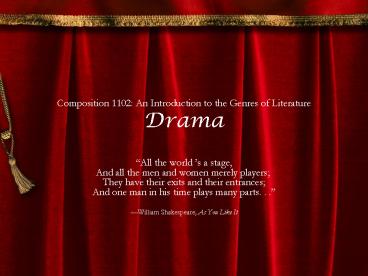Composition 1102: An Introduction to the Genres of Literature Drama - PowerPoint PPT Presentation
1 / 11
Title:
Composition 1102: An Introduction to the Genres of Literature Drama
Description:
Drama's Classical History. Drama arose from ancient Greek ceremonial events: ... Costumes and makeup can create fantastic characters ... – PowerPoint PPT presentation
Number of Views:84
Avg rating:3.0/5.0
Title: Composition 1102: An Introduction to the Genres of Literature Drama
1
Composition 1102 An Introduction to the Genres
of LiteratureDrama
- All the world s a stage,And all the men and
women merely players They have their exits and
their entrancesAnd one man in his time plays
many parts. . . - William Shakespeare, As You Like It
2
Drama An Overview
- CLASSICAL LITERARY THEORY
- Aristotle in Ars Poetica states that the true
essence of drama is - . . . Imitated human action
3
There are three necessary elements for the show
to go on
- A story must be told. . .
- A story must be told in action. . .
- A story must be told in action by actors
impersonating characters.
4
Dramas Classical History
- Drama arose from ancient Greek ceremonial events
- COMEDY Dionysian fertility rites
- TRAGEDY sacrifices to the gods, Gr. Tragoidia,
song of the goat
5
Some key terms relating to Greek tragedy. . .
- Catharsis the purifying of the emotions or
release of emotional tension, i.e., audience
purged of fear and pity - Hamartia the protagonists tragic flaw (a man
of stature falls from grace due to this weakness
) - Deus ex machina (Gr. god from a machine) a
figure representing a deity which intervenes in
the action today any character or event brought
artificially into a story or drama to solve
problem
6
Creating Reality Onstage
- Dramatic conventions are used in theatre. They
are devices, substitutions made onstage to serve
as reality - Actors are the persons of the story
- The stage is scene/geographical setting
- Intervals between acts and scenes represent time
passing (can expand or contract) - We accept that characters communicate in speeches
and/or soliloquies - Costumes and makeup can create fantastic
characters - Lighting can enforce the plot and create meaning
7
The Comic Vision
- Comedy is the fraternal twin of tragedy
- . . .many comedies are filled with tragic
potential, and many tragedies contain potentially
comic plots (Roberts and Jacobs) - COMEDY moves toward success, happiness, and
marriage, while TRAGEDY moves toward despair and
death.
8
More About Comedy. . .
- Comedy evolved from the Greek notion of the
komos song, or song of revels, sung by
merrymakers - Diction (level of formality) is often low
colloquial, spoken by common man, witty,
sometimes bawdy - Enacted in the hope that enacting the play would
encourage divine favor (happiness and prosperity) - The comic pattern our response is in keeping
with the comic situation (i.e., in the case of
slapstick, being hit with a paddle is not funny)
9
Comedy Is. . .
- (Roberts and Jacobs)
- . . .a pattern of action, including funny
situations and language, that we perceive as
solvable and correctable. . . - A goal for the playwright is a resolution that
satisfies us. - The spectator perceives
- Comic patterns gtfueled by confusion,
misunderstandings and mistakes - Comic climax gtpressure is at a high point and
choices must be made - Comic characters gtlimited more that tragedy,
often employs types - Comic language gtvery important! Includes wit,
puns, bawdy jokes and double entendres
10
The Tragic Vision
- Tragedy tells of a renowned person who falls as
a result of some error, or frailty, or due to the
influence of external or internal forces, or
both - The reversal of action and growth of
understanding for the main character is what
Aristotle calls the peripete. - The moment of comprehension (anagnorisis) is when
the protagonist comes to understand his/her place
in the scheme of things. - Question to consider In Eugene ONeills Before
Breakfast, what is Mr. Rowlands tragic flaw?
When is the anagnorisis?
- The tragic vision impels the man of action to
fight against his destiny. . . and state his case
before God or his fellows. It impels the artist,
in his fictions, toward boundary-situationsman
at the limits of his sovereignty Job on the
ash-heap, Prometheus on the crag, Oedipus in his
moment of self-discovery, Lear on the heath, Ahab
on his lonely quarter-deck. . .(Sewall, "The
Vision of Tragedy")
11
THATS ALL FOLKS!
- The End































